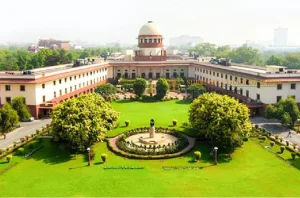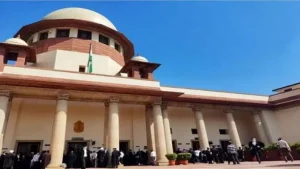

Of Cows and Life Imprisonment
- /
- Articles and Blogposts /
- Of Cows and Life Imprisonment
Unless you have been in hiding or have sworn off reading news, you will know that currently, the consumption of beef in India is a hotly debated moo(t) point. Bad puns aside, the arguments and frenzy surrounding the slaughter of cattle have reached a breaking point. Last Friday on 23 May, 2017, the Ministry of Environment (MoE) passed a notification under the Prevention of Cruelty to Animals Act (PCA Act) that effectively banned the sale of cows and buffaloes for slaughter through animal markets.
Given the wide reaching socio-economic impact of such regulations, it is unsurprising that High Courts across the country are weighing in on the constitutional protection of bovines. While the High Court of Kerala has dismissed a public interest litigation (PIL) and held that the notification does not violate the Constitution, the Madurai Bench of the High Court of Madras ordered a month long stay of the Central Government notification.
It is perhaps however, the High Court of Rajasthan that has made the most sensational (?) pronouncement to date. On 31 May, 2017, a day before his retirement, Justice Mahesh Chandra Sharma of the Jaipur Bench of the Court passed a 139 page order in the case of Jago Janta Society vs. State Of Rajasthan and Others.[1] In this writ petition, the petitioner, a Jaipur based organisation, sought intervention on the maintenance of cows in Jaipur’s Hingonia Gaushala. In his judgment, Justice Sharma has passed numerous directions, which include among others, appointment of the Chief Secretary and Advocate General of Rajasthan as persons in loco parentis[2] for preservation of cattle; efforts to be made to declare the cow as the national animal of India; and to increase the punishment for cow slaughter under the Rajasthan Bovine Animal (Prohibition of Slaughter and Regulation of Temporary Migration or Export) Act, 1995, to life imprisonment.
In light of the third direction mentioned above, it is worth taking a look at life imprisonment as prescribed under our primary criminal legislation, the Indian Penal Code (IPC). Hypothetically, if cow slaughter was in fact made an offence that was punishable with life imprisonment, under the IPC it would join the company of 63 other crimes that prescribe this strict punishment. Some of the grave offences that are punishable with life imprisonment are sedition[3], culpable homicide[4], and murder[5]. The offences punishable with life imprisonment mainly fall under the categories of offences against the state, against public justice, against the human body and against property. There are no other crimes that deal with the harming or killing of animals that attract such punishment. It is interesting to note that in his judgement, Justice Sharma directed the Rajasthan state government to work with the departments of the Central Government for preservation and protection of cattle, to give the cow the status of a legal entity.
According to the National Crime Record Bureau (NCRB) Report on Crime in India 2015, in the year 2015, 3.35 lakh ‘violent crimes’ were reported, which constituted nearly 10 per cent of the total 29.49 lakh IPC crimes reported that year. Almost all violent crimes, which include but are not restricted to murder, rape, kidnapping, arson, and robbery, are punishable with life imprisonment. According to the NCRB report, violent crimes have a conviction rate of 26.7 per cent. If we did some very simplistic and statistical translation, it means that if the directions of Justice Chandra are upheld, and one is booked for cattle slaughter, you have a 25 per cent chance of spending the rest of your days[6] in jail.
While things may be looking up for cows, the same cannot be said for many others in our country, particularly women who are victims of violent crimes. It is noteworthy that life imprisonment is not the default punishment for the crime of dowry related death under Section 304B of the IPC, which reads as follows ‘a term which shall not be less than seven years but which may extend to imprisonment for life.’. It is even more noteworthy that globally, India is one of 49 nations that does not criminalize marital rape. When the legal and judicial systems start working to protect cattle better than women, it’s clear we have a problem on our hands.
[1] Civil Writ Case Number. 15585 of 2010.
[2] It is a legal doctrine that means “in place of a parent” or “instead of a parent.” It refers to the legal responsibility of some person or organization to perform some of the functions or responsibilities of a parent.
[3] Sections 124A of the Indian Penal Code, 1860.
[4] Sections 299 and 304 of the Indian Penal Code, 1860.
[5] Sections 300 and 302 of the Indian Penal Code, 1860.
[6] Life imprisonment is sanctioned under Sections 45 and 53 of the IPC. It has been held by the Supreme Court in cases such as Gopal Vinayak Godse vs. State of Maharashtra (1961 AIR 600) and Maru Ram vs. Union of India (1980 AIR 2147) that life imprisonment has no minimum time period and lasts until the last breath of the prisoner.
The views expressed in this article are solely those of the author’s and they do not represent the views of DAKSH.

Ramya Tirumalai
RECENT ARTICLES



Lessons for Judiciary from Space Sector

The missing piece in India’s reform story—a strong tribunal system

-
Rule of Law ProjectRule of Law Project
-
Access to Justice SurveyAccess to Justice Survey
-
BlogBlog
-
Contact UsContact Us
-
Statistics and ReportsStatistics and Reports
© 2021 DAKSH India. All rights reserved
Powered by Oy Media Solutions
Designed by GGWP Design